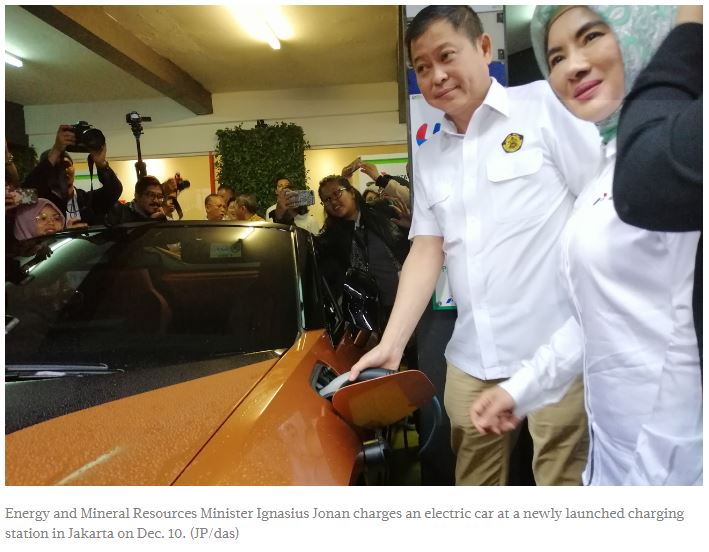Indonesia: Govt upbeat over electric vehicle, but charging stations still rare to find
Industry players and experts have urged the government to ensure adequate infrastructure for electric vehicles (EV), including battery charging stations, before implementing a planned regulation that will speed up incentives for production.
While the government has vowed to provide fiscal incentives for EVs, it should also prepare crucial infrastructure to support them, said Jongkie Sugiarto, cochairman of the Association of Indonesian Automotive Manufacturers (Gaikindo).
“Besides [fiscal] incentives, charging stations must also be allocated immediately,” he told The Jakarta Post on Friday.
The government has vowed to issue a presidential regulation (Perpres) to incentivize the use EVs by lowering the rate of luxury goods tax (PPnBM) and exempting them from import duties.
The incentives are part of an effort to reach the goal of having 2.1 million electric motorcycles and 2,200 hybrid or electric cars on the road by 2025 as mandated in Presidential Regulation No. 22/2017 on the national public energy plan.
State electricity firm PLN and state energy holding company Pertamina have been installing charging stations in recent years, but they are still limited to Jakarta.
The lack of mass-scale installation of charging stations was merely due to concerns over supply and demand, said Djoko Rahardjo Abumanan, PLN’s regional business director for the eastern part of Java, Bali and Nusa Tenggara.
“It’s like a chicken and egg situation; should we provide charging station first or wait for the EV cars to be used at a mass scale? For sure, we don’t want to be disbursing [funds to install stations] without guaranteed sales,” he told The Post over the phone. “But we will be more than ready if demand arises, especially after the Perpres on EVs has been issued.”
PLN is now focusing on building charging stations for EVs under a business-to-business scheme, such as the ones for bus fleets of state-owned public transportation operator Perum Damri and Jakarta-owned bus operator PT Transjakarta.
Another option to prevent EV infrastructure from burdening the state budget would be to incentivize the private sector, in this case commercial property owners, to provide charging stations, said Jongkie of Gaikindo. He suggested that the government exempt the owners of commercial properties, such as malls and offices, from import duties of charging station equipment.
“By providing charging stations, [property owners] will see a boost in their assets’ popularity,” he said.
Energy expert Fabby Tumiwa from the Institute for Essential Services Reform concurred that ensuring infrastructure for EVs, such as charging stations, and good demand for the vehicle was also important, aside from the manufacturing side like batteries and engine production.
According to a Sept. 6 draft of the EV regulation obtained by the Post, the government plans for fiscal and non-fiscal incentives that will be given to producers of vehicles and batteries, battery waste management companies, research institutions, charging stations and electric motorbike owners.
Under the fiscal incentives category are import duties, luxury goods tax, charging station procurement, financing for the battery-swap industry and export financing. The non-fiscal incentives include free parking fees and special parking spots for EVs, charging station financing and certification for EV technicians.
Industry players are still reluctant to produce or market EVs in Indonesia as they believe the government’s fiscal incentives plan remains unclear, said Hendrik Wiradjaja, deputy marketing director for Hyundai Mobil Indonesia, part of South Korean automotive giant Hyundai Motors.
Currently, Hendrik said, there were no import duty exemptions for hybrid or dual-engine cars, which have both electric and combustion engines. At the same time, Gaikindo has suggested that the ideal luxury tax rate for EVs be 2 to 3 percent, making them competitive against conventional cars, he added.
The government initially targeted to issue the EV regulation in December 2018, but Industry Minister Airlangga Hartarto recently said it would be completed no later than April, or before the presidential election. International carmakers such as BMW and Volkswagen are waiting for the regulation as they have expressed interest in investing in Indonesia, he said.
The draft regulation is currently under consultation with the House of Representatives to ensure it would be in line with the prevailing Value Added Tax (PPN) Law, said Finance Minister Sri Mulyani Indrawati.
Meanwhile, the Transportation Ministry is building a car test facility worth between Rp 1.5 trillion (US$105.9 million) and Rp 2 trillion to inspect the readiness of EVs in terms of the reliability of their batteries, speed and charging stations. Passing the test would be one of the future requirements for EV companies to obtain import or production permits, said the ministry’s director for land transportation facility, Sigit Irfansyah.
“However, before the facility is completed, industry players are required to obtain product safety certification from their countries of origin. We will not hamper the development of EVs,” he said, adding that the ministry was seeking investors and the facility was expected to be completed by 2020.
Source: https://www.thejakartapost.com/news/2019/01/20/planned-rule-on-electric-vehicles-leaves-questions-on-infrastructure.html


 Thailand
Thailand




